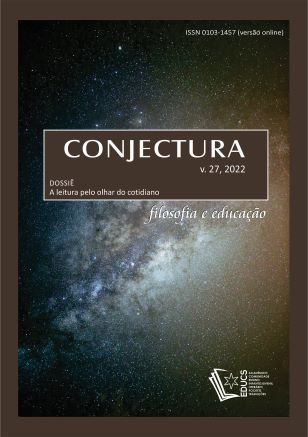Reading modes and practices, digital challenges
DOI:
https://doi.org/10.18226/21784612.v27.e022009Keywords:
Written culture, Reading modes and practices, Book, Library, Digital reading.Abstract
Written culture, literacy and schooling mark a long Modernity of more than four centuries in the History of the Western World. Written culture brings together information, knowledge, thought, action. Written acculturation was a condition and factor for knowledge, citizenship and humanity. Since the end of the Middle Ages, with the spread of paper and the mechanization of typography, the world of reading has changed, as a result of the greater dissemination of the printed book. In the transition from the Old Regime, reading and writing were usual practices in the sphere of the State and public administration, and became a condition of citizenship. School made reading mandatory. During the 1800s, the progressive universalization of school literacy and the constitution of the public sphere benefited from new technical advances in the publishing world, in the popularization of books, in the dissemination of periodicals, in the creation of libraries. In the course of the 20th century, mass culture through books, audio and cinema brought the omnipresence of reading. Reading rates grew until the end of the century, but since the 1980s the digital and the new modes to read have only partially made up for the devaluation of traditional forms of culture and reading. Combining the evolution of written culture, books and ways of reading, a sequence of historical frameworks is structured: i) a cycle centered on the print and the book, which was accentuated with Illustration – book order, speaking like a book, learn from the book; ii) a cycle characterized by new ways of reading and new readers – the school reader and “reading nations”; iii) a cycle that was accentuated in the second half of the 19th century, of mass acculturation centered on the press, books, periodicals and libraries; iv) a cycle that lasted until the turn of the 20th century, of universal reading of print and audiovisual, with emphasis on radio, cinema and television, this in domestic spaces, characterized by mass culture and globalization; v) the current cycle of digital universalization with new modes of acculturation and communication. I will draw an overview of these four centuries of acculturation and sociability through reading and writing, with reference to these cycles.
References
BARATIN, Marc; JACOB, Christian (Dir.). O poder das bibliotecas. A memória dos livros no Ocidente. Rio de Janeiro: Editora UFRJ, 2000.
CAMEIRA, Emmanuel (2015). A leitura digital no mundo. Incursão por alguns estudos internacionais. In: CARDOSO, Gustavo (Coord.). O livro, o leitor e a leitura digital. Lisboa: Fundação Calouste Gulbenkian, 2015, p. 151-222.
CAMPELLO, Bernardete Santos; CALDEIRA, Paulo da Terra; ALVARENGA, Maura; SOARES, Laura Valladares de Oliveira. Situação das bibliotecas escolares no Brasil: o que sabemos? Revista Biblioteca Escolar em Revista, USP, v. 1, n. 1, p. 1-29, 2012. (Acesso em: 22 mar. 2018) DOI: http://dx.doi.org/10.11606/issn.2238-5894.berev.2012.106555
CARDOSO, Gustavo (Coord.) O livro, o leitor e a leitura digital. Lisboa: Fundação Calouste Gulbenkian, 2015.
CHARTIER, Anne-Marie. L’École et la lecture obligatoire. Histoire et paradoxes des pratiques d’enseignement de la lecture. Paris: RETZ, 2007.
CHARTIER, Roger. Do livro à leitura. In: CHARTIER, Roger (Org.). Práticas da leitura. São Paulo: Editora Estação Liberdade, 1996, p. 77-105.
CHARTIER, Roger. A ordem dos livros. Lisboa: Vega, 1997.
CHARTIER, Roger. Prólogo a esta Edición. Libro y lectura en el mundo digital. In: CAVALLO, Guglielmo; CHARTIER, Roger (Dir.). Historia de la lectura en el Mundo Occidental. Madrid: Santillana Ediciones Generales/ Prisa Ediciones, 2011, p. 13-24.
CLAIR, William St. The reading nation in the Romantic period. Cambridge: Cambridge UniversityPress, 2007.
DELANNOY, Jean-Pierre. Guia para a transformação de bibliotecas escolares. Lisboa: Livros Horizonte, 1976.
EVANS, Christophe (Dir.). Lectures et lecteurs à l’heure d’internet. Livre, Presse, Bibliothèques. Paris: Éditions du Cercle de la Librairie, 2011.
LERNER, Fred. The story of libraries. From the invention of writing to the computer age. New York; London: Continuum, 1998.
MAGALHÃES, Justino. Bibliotecas Escolares, modelando e instituindo: Perspectiva histórico-pedagógica. In: CASTRO, Cesar Augusto; CASTELLANOS, Samuel Luis VELÁZQUEZ (Org.). História da escola. Métodos, disciplinas, currículos e espaços de leitura. S. Luís do Maranhão: EDUFMA/ Café & Lápis, 2018, p. 433-452.
MAGALHÃES, Violante F. O ‘efeito de ficção’ na leitura juvenil. In: Teresa e Alexandre Soares dos Santos – Iniciativa Educação, 2020. https://www.iniciativaeducacao.org/pt/ed-on/ed-onartigos/o-efeito-de-ficcao-na-leitura-juvenil
MAYEUR, Françoise. De la Révolution à l’Ecole Républicaine (1789-1930). LOUIS-HENRI (Dir). Histoire de l’enseignement et de l’éducation. Tome III. Paris: Nouvelle Librairie de France, 1991, p. 523 e ss.
MIRANDA, Margarida. Código pedagógico dos jesuítas. Ratio Studiorum da Companhia de Jesus (1599). Regime Escolar e Curriculum de Estudos. Lisboa: Esfera do Caos, 2009.
MOLLIER, Jean-Yves. La lecture et ses publics à l’Époque contemporaine. Essais d’Histoire Culturelle. Paris: Presses Universitaires de France, 2001.
MOLLIER, Jean-Yves; SIRINELLI, Jean-François; VALLOTON, François (Dir.). Culture de masse et culture médiatique en Europe et dans les Amériques 1860-1940. Paris: Presses Universitaires de France, 2006.
NELLES, Paul. Justo Lípsio e Alexandria: as origens ‘arqueológicas’ da história das bibliotecas. In: BARATIN, Marc; JACOB, Christian. O poder das bibliotecas. A memória dos livros no Ocidente. Rio de Janeiro: Editora UFRJ, 1996, p. 200-216.
POULAIN, Martine (Dir.). Histoire des bibliothèques françaises. Les bibliothèques au XXe siècle (1914-1990). Paris: Promodis/Éditions du Cercle de la Librairie, 1992.
SÃO VÍTOR, Hugo de. Didascálicon. Da Arte da Leitura. Petrópolis: Editora Vozes, 2001.
WAQUET, Françoise. Parler comme un livre. L’Oralité et le Savoir (XVIe-XXe siècle), Paris: Albin Michel, 2003.
Downloads
Published
How to Cite
Issue
Section
License
1. The publication of the originals will imply the assignment of copyright to Conjectura Journal.
2. Texts cannot be reproduced without authorization from the Journal after acceptance.









